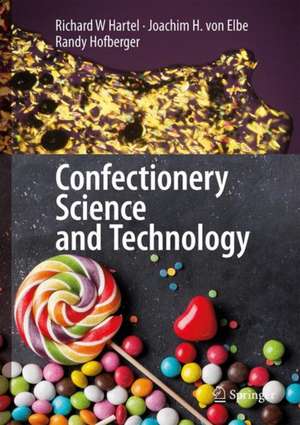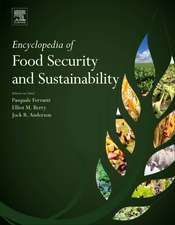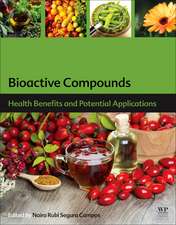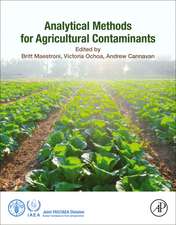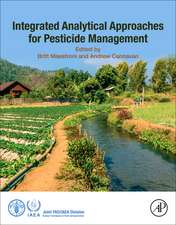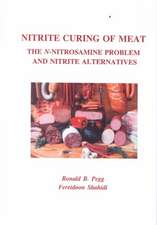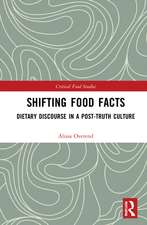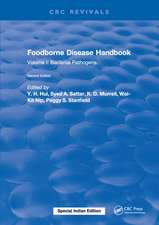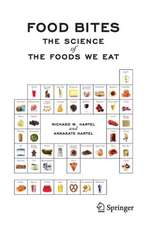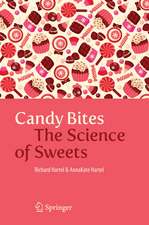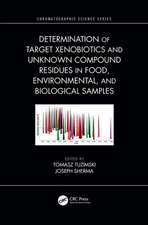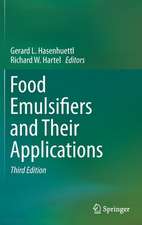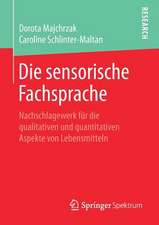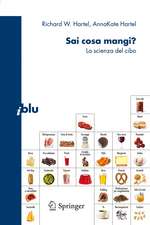Confectionery Science and Technology
Autor Richard W. Hartel, Joachim H. von Elbe, Randy Hofbergeren Limba Engleză Hardback – 23 oct 2017
| Toate formatele și edițiile | Preț | Express |
|---|---|---|
| Paperback (1) | 482.62 lei 39-44 zile | |
| Springer International Publishing – 24 aug 2018 | 482.62 lei 39-44 zile | |
| Hardback (1) | 807.64 lei 6-8 săpt. | |
| Springer International Publishing – 23 oct 2017 | 807.64 lei 6-8 săpt. |
Preț: 807.64 lei
Preț vechi: 984.93 lei
-18% Nou
Puncte Express: 1211
Preț estimativ în valută:
154.55€ • 165.26$ • 128.85£
154.55€ • 165.26$ • 128.85£
Carte tipărită la comandă
Livrare economică 17 aprilie-01 mai
Preluare comenzi: 021 569.72.76
Specificații
ISBN-13: 9783319617404
ISBN-10: 3319617400
Pagini: 536
Ilustrații: XXI, 536 p. 228 illus., 59 illus. in color.
Dimensiuni: 178 x 254 x 37 mm
Greutate: 1.18 kg
Ediția:1st ed. 2018
Editura: Springer International Publishing
Colecția Springer
Locul publicării:Cham, Switzerland
ISBN-10: 3319617400
Pagini: 536
Ilustrații: XXI, 536 p. 228 illus., 59 illus. in color.
Dimensiuni: 178 x 254 x 37 mm
Greutate: 1.18 kg
Ediția:1st ed. 2018
Editura: Springer International Publishing
Colecția Springer
Locul publicării:Cham, Switzerland
Cuprins
Preface.- 1.Chemistry of bulk sweeteners.- 2.Physico-chemical properties of sweeteners in confections.- 3.Water.- 4.Fats, oils and emulsifiers.- 5.Starch, proteins and gums.- 6.Other ingredients.- 7. Compressed tablets and lozenges.- 8.Hard candy.- 9.Fondants and creams.- 10.Caramels, fudge, toffee.- 11.Marshmallow, nougat and chews.- 12.Jelly and gummy candies.- 13. Sugar and sugar-free panned confections.- 14.Chewing and bubble gum.- 15.Chocolate.- 16.Compound coatings.- 17.Chocolate panning.- 18.Glossary.- Index.
Notă biografică
Richard W. Hartel, is Professor of Food Engineering with the Department of Food Science at the University of Wisconsin-Madison. He conducts research on phase transitions in foods, primarily sugar confections, chocolate and ice cream. He teaches courses in Food Manufacturing, Food Preservation, Food Functionality, and Candy Science, as well as a freshman career orientation course. He has been involved with the UW Resident Course in Confectionery Technology (candy school) as an instructor since 1987 and as lead coordinator since 1998.
Randall (Randy) Hofberger is the principle of R & D Candy Consultants LLC. Previously he had a long career at Nestle Confections USA in technical applications with an emphasis on caramels and chocolates. He has been an instructor at various confectionery courses including UW Resident Course in Confectionery Technology (candy school) and Retail Confectioners International (RCI).
Joachim H. von Elbe, is Professor and Chairman Emeritus with the Department of Food Science at the University of Wisconsin. He served for 38 years teaching courses in food chemistry with emphasis on plant pigments, their use as food and pharmaceutical colorants, and color and texture changes in canned vegetables. In 1963 he introduced, with cooperation with the confectionery industry, a three week candy technology course designed specifically for people in the industry. Since that time the course has been taught annually, and is now known as the UW Resident Course in Confectionery Technology.
Randall (Randy) Hofberger is the principle of R & D Candy Consultants LLC. Previously he had a long career at Nestle Confections USA in technical applications with an emphasis on caramels and chocolates. He has been an instructor at various confectionery courses including UW Resident Course in Confectionery Technology (candy school) and Retail Confectioners International (RCI).
Joachim H. von Elbe, is Professor and Chairman Emeritus with the Department of Food Science at the University of Wisconsin. He served for 38 years teaching courses in food chemistry with emphasis on plant pigments, their use as food and pharmaceutical colorants, and color and texture changes in canned vegetables. In 1963 he introduced, with cooperation with the confectionery industry, a three week candy technology course designed specifically for people in the industry. Since that time the course has been taught annually, and is now known as the UW Resident Course in Confectionery Technology.
Textul de pe ultima copertă
This book examines both the primary ingredients and the processing technology for making candies. In the first section, the chemistry, structure, and physical properties of the primary ingredients are described, as are the characteristics of commercial ingredients. The second section explores the processing steps for each of the major sugar confectionery groups, while the third section covers chocolate and coatings. The manner in which ingredients function together to provide the desired texture and sensory properties of the product is analyzed, and chemical reactions and physical changes that occur during processing are examined. Trouble shooting and common problems are also discussed in each section.
Designed as a complete reference and guide, Confectionery Science and Technology provides personnel in industry with solutions to the problems concerning the manufacture of high-quality confectionery products.
Caracteristici
Written by renown confectionery experts in academia and industry Serves as an essential reference for any confectionery professional Excellent resource for confectionery students Includes supplementary material: sn.pub/extras
